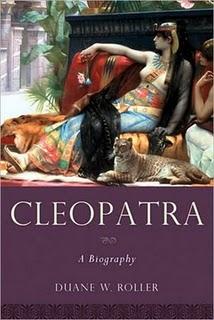Cleopatra: A Biography

Cleopatra is a cipher, an enigmatic and historically remote figure reimagined until she has become, for much of the world and for much of modern history, the apotheosis of desire, representative of the potency of feminine allure. As with the search for the historical Jesus, separating the real figure from the myth is complicated not only by our fascination with all the artistic interventions and the millennia of (mis)representation but also by the paucity of hard evidence. The slender record that remains is complicated by the bias of her contemporary observers (mostly suspicious and resentful Romans) and the tangle of political agendas that surrounded her reign.
Distinguishing reality from the myth is Duane Roller’s project in his new biography of Cleopatra. He marshals the modest amount of fairly reliable biographical information, supplemented by a helpful sketch of the political and social world of Ptolemaic Egypt in the first century BCE. But was Cleopatra, well, Cleopatra?
Sources disagree about her physical attractiveness, although it seems likely that she was relatively short. The book offers an array of physical images from statuary and contemporary coinage, but there is little commonality among the images, so her actual appearance remains mysterious. The record of her ascent to the throne and involvement in Roman politics would seem to confirm her reputation as ruthless and Machiavellian, although her supposed suicide by snakebite is almost certainly fictional, as Joyce Tyldesley, who covers much of the same ground in her new book Cleopatra: Last Queen of Egypt, has convincingly demonstrated.
Readers hoping to find some account of the controversy over Cleopatra’s racial identity, that has been such an exciting and often public part of contemporary academic discussion, will be disappointed. Further, Roller’s diction seems dated (“the marriage produced no issue” and his use of B.C., for example). What would solidly justify this project is a “new” Cleopatra, one firmly rooted in newly discovered or reinterpreted documentary evidence and grounded in the historical context in which she moved. The same constraint that excludes the mythic elements from this study also seems to prevent a newly and sharply imagined Cleopatra from emerging here.
The closest the author comes to a revisionary portrait is in his account of Cleopatra’s public oratory, and particularly in her apparent authorship of treatises on stunningly banal subjects such as treating dandruff or curing baldness. In 'The Cosmetics,' a collection of writing attributed to her, we see a leader not exclusively concerned with war and geopolitics, but also with the everyday welfare of her people.
Roller’s approach can tell us the types of boats that sailed on the Kydnos River and the apparel Egyptian queens would have worn. But it misses the spiritual force of that figure still resplendent and still threatening two millennia later.
And as long as we claim to ignore it, racism and segregation will prosper! Read some Audre Lorde, folks.
As long as we fixate on race, segregation will prosper!
As one who grew up in the segregated South and has lived for several years in the segregated North, the idea that we are a post-racial society is simply naive. Claiming that we do (or should) ignore race is just another rhetorical tactic that, in practice, maintains a racist society. Only in recognizing the role race plays in our lives, and learning to value difference, will we get to a place where racial discrimination is no longer a problem.
As one who grew up in the segregated South, I abhor the reviewer's suggestion that Cleopatra's racial identity should be an object of discussion. Are we not past defining people by race? Clearly the reviewer believes otherwise.
Every person is qualified to have an opinion about the merits of a book he or she has read. Ad hominem arguments have no relevance here.
Who is this Rick Taylor character? What are his qualifications to review a book on Greek and Roman history? They seem ephemeral at best.
A blah review that understates the book's interest.
The reviewer has missed the point and has fallen into all the traps that the author sought to avoid. Cleopatra's racial identity or beauty are far less important that her intellectual prowess or administrative ability. I read the book and found no discussion of "boats on the Kydnos" or "the apparel Egyptians queens wore". Did he even read the book? Misses the spiritual force? Did the reviewer even notice that the author suggested there is evidence that the queen was candidate for the Messiah? What could be more spiritual. Quibbling about the author's diction is trivial.